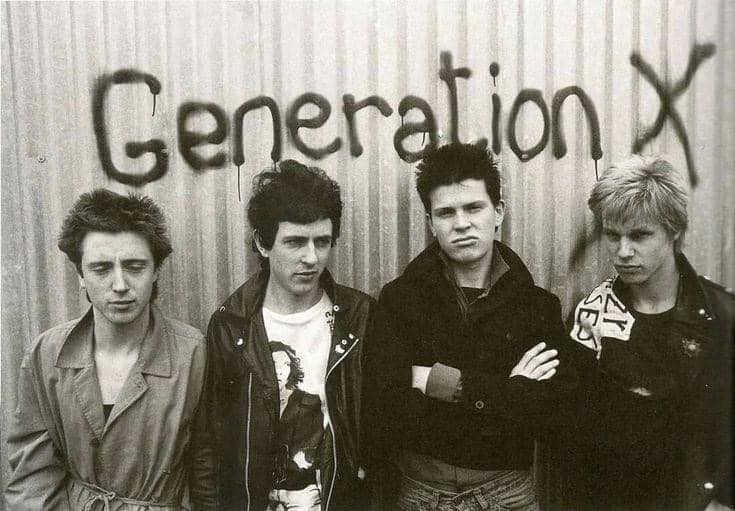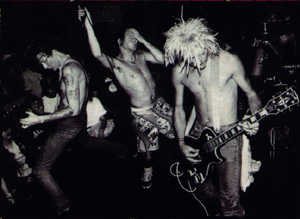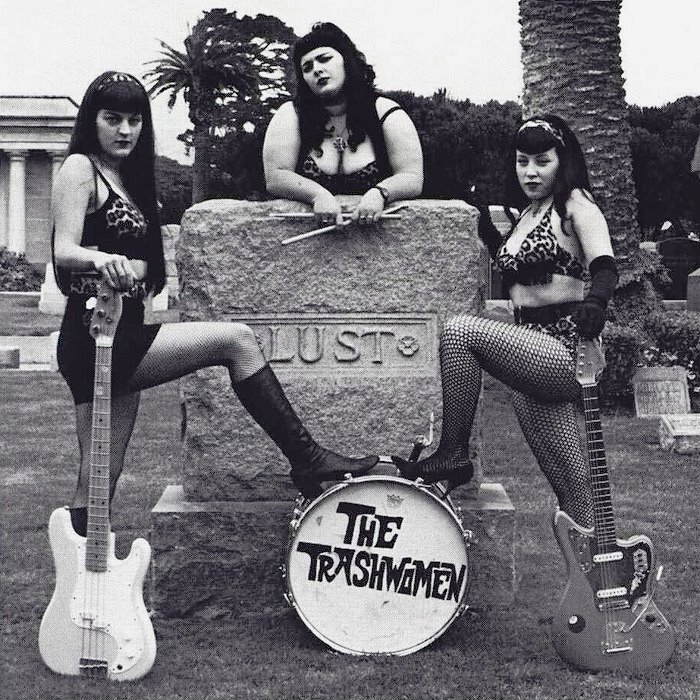Generation X

Generation X, later known as Gen X, was a pioneering English punk rock band formed in London in 1976. Fronted by Billy Idol, the band became one of the early faces of the punk movement, releasing several successful singles and albums during their career. Notable for their blend of punk energy with more melodic pop sensibilities, they helped define the sound and image of the late ’70s punk scene in the UK.
History
Formation
Generation X was formed during the burgeoning punk scene in London in late 1976 by Billy Idol (then William Broad), bassist Tony James, and drummer John Towe. The trio initially joined a band called Chelsea but left after creative differences with its vocalist, Gene October. Idol and James decided to form a new band, Generation X, with Idol as the frontman. The band took its name from a novel that Idol’s mother owned.
Their first lineup was completed with guitarist Bob “Derwood” Andrews, and they played their first show at the Central School of Art and Design in December 1976. Soon after, Generation X became the first band to play at the newly opened punk club, The Roxy, in London.
1977–1978: Breakthrough and Early Success
By 1977, Generation X was gaining momentum in the punk scene. They signed a recording contract with Chrysalis Records and released their debut single, “Your Generation,” which made an impact on the UK Singles Chart. They followed up with the release of their debut album Generation X in 1978, which reached No. 29 on the UK Albums Chart.
Unlike many of their punk contemporaries, Generation X’s music had a more melodic, pop-oriented sound, which helped them stand out but also brought criticism from the more radical elements of the punk community. Their lyrics focused on youth, rebellion, and personal expression rather than politics.
1979: Valley of the Dolls and Band Tensions
In 1979, Generation X released their second album, Valley of the Dolls, produced by Ian Hunter. The album’s lead single, “King Rocker,” reached No. 11 on the UK Singles Chart, becoming the band’s highest-charting single. Despite this success, the album’s more polished rock sound was met with mixed reviews, and the band began facing internal tensions, particularly between Idol and guitarist Bob “Derwood” Andrews.
As the year progressed, these tensions worsened, leading to the departure of Andrews and drummer Mark Laff. This marked the end of the original Generation X lineup, and Idol and James decided to reform the band with a new lineup under the shortened name Gen X.
1980–1981: Gen X and Breakup
With new members, including drummer Terry Chimes (formerly of The Clash), Gen X recorded their third album, Kiss Me Deadly, in 1980. The album showcased a more experimental, new wave-influenced sound, but it failed to chart significantly, and the band’s popularity waned. The single “Dancing with Myself,” which would later become a hit for Billy Idol as a solo artist, was one of the standout tracks from this period.
By early 1981, with commercial success eluding them and internal conflicts mounting, Gen X disbanded. Billy Idol soon embarked on a solo career, moving to New York City and becoming a global pop star in the 1980s with hits like “White Wedding” and “Rebel Yell.”
Reunions
Generation X briefly reunited for a one-off performance in 1993 during Idol’s ‘No Religion’ tour. In 2018, Billy Idol and Tony James performed alongside Steve Jones and Paul Cook of the Sex Pistols under the name Generation Sex, playing a mix of Generation X and Sex Pistols songs at a special show in Los Angeles.
Discography
- Generation X (1978)
- Valley of the Dolls (1979)
- Kiss Me Deadly (1981)
- K.M.D. – Sweet Revenge (1998)
Legacy
Generation X played a crucial role in shaping the UK punk rock scene. Their blend of punk attitude with pop melodies helped pave the way for the crossover success of punk into mainstream music. Billy Idol’s later solo success ensured that Generation X’s legacy would be remembered, not just as a footnote in punk history but as a vital part of the genre’s evolution.





